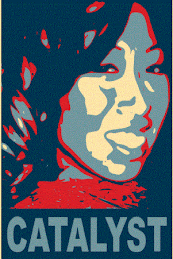“Cuando Sali De Cuba” (When I Left Cuba)
Composer: Luis Aguilé, 1963
Performed by Celia Cruz, c. 1966
“Cuando Sali De Cuba” may be described by some as a “flowery, melancholy style that Latinos find irresistible”, but serves as the U.S. American experience of Cuban refugees like Celia Cruz in the 1960s (CUBANOCAST). The beauty of this song makes it a universal appeal for many Latin American immigrants, not just those from Cuba.
Even recording artist (and Cuban refugee) Gloria Estefan performed the song as a little girl and lamented, “Every night I say a silent prayer that someday I might go back to the land I love.”
Analysis of the Lyrics
Like a country-western song, the bittersweet refrain of “Cuando Sali De Cuba” shares the pain and anguish of having a loved one miles away. “I could never die, I don't have my heart here, Somebody is waiting for me, Waiting for me to come back here.”
When Celia Cruz Left Cuba
Celia Cruz’s true life story arguably embodies this song the most. When Cruz left Cuba in 1960, she believed that she would return. She then decided to settle in the United States. Sadly, when her mother died two years later, the Castro government would not allow her to return for the funeral (Contreras).
Unable to return to Cuba, she pursued her music career in New York City. There she faced audiences that dismissed her as irrelevant to their current musical and cultural preferences (Abreu). The boom in ethnic pride of the 1970s, though, allowed Celia to emerge as the only female superstar of salsa, the "new" sound of Latin music, providing a heroine for young Latina-Americans (as well as the rest of the Latin countries of the world.)
The Queen of Salsa
Sharing her spirit is what Cruz does best. Usually, her music is an uplifting and inspiring celebration of Cuban culture. Cruz reigned as “The Queen of Salsa” for six decades; her music still on frequent rotation at any salsa club.
Cruz explained that salsa "is just a marketing term applied to what originally was Cuban music. Since this type of music was being played by musicians of all nationalities in the United States, it started to evolve with its own 'flavor.' Maybe that's why the term "salsa" ('saucy') stuck" (Abreu).
Her life and colorful career were even featured in a retrospective exhibit at the National Museum of American History in Washington, D.C. called "Azucar, the Life and Music of Celia Cruz" (Contreras).
Her signature song, “Guantanamera,” would be the upbeat counterpart to “Cuando Sali De Cuba.” It’s a love song about a sassy Cuban girl, but is the country’s most noted patriotic song.
Latina Pride
Anyone who has heard a salsa song by Cruz, knows that she is known to exclaim, “Azucar!” which literally means "sugar." However as the curator of Latino history at the museum Marvette Perez notes, it served Cruz as a "battle cry" and an allusion to African slaves who worked Cuba's sugar plantations (Contreras).
The “ethnic pride boom” of the 1970s was because between 1960 and 1980, the number of Latinos/as in New York City nearly doubled itself, growing from 757, 231 to just over 1.4 million. Immigrants from the Caribbean, specifically the islands of Cuba, Puerto Rico, and the Dominican Republic, made up close to 75 percent of that total population (Abreu 2).
Businesses began to take notice of the population growth and began to accommodate the demand, visibly through an increase in the number of Latino/a restaurants, nightclubs, clothing and craft stores, and cultural centers clustered throughout the city
In the 2008 documentary “Celia the Queen,” Cruz is regaled by other Cuban American artists such as Gloria Estefan and Andy Garcia, who says, “Celia is breath to us; she is oxygen.” Her appearances on Sesame Street showed the United States that her appeal goes beyond Latin Americans. At her funeral, her life was celebrated as someone who brought people together and left a legacy that will not soon be forgotten.
“Cuando Sali De Cuba”
Music and lyrics by Luis Aguilé
Nunca podre morirme,
Mi corazon no lo tengo aqui
Alguien me esta esperando
Me esta aguardando que vuelva aqui
Alguien me esta esperando
Me esta aguardando que vuelva aqui
Cuando sali de Cuba,
Deje mi vida deje mi amor
Cuando sali de Cuba,
Deje enterrado mi corazon.
Deje enterrado mi corazon.
Late y sigue latiendo
Porque la tierra vida le da,
Pero llegaraun dia
En que mi mano te alcanzara
Cuando sali de Cuba
Una triste tormenta
Te esta azotando sin descansar
Pero el sol de tus hijos
Pronto la calma te hara alcanzar
Cuando sali de Cuba
Cuando sali de Cuba
Deje enterrado mi corazon,
Mi corazon, mi corazon.
Translation:
Translation:
I could never die,
I don't have my heart here
Somebody is waiting for me Waiting for me to come back here
When I left Cuba,
I left my life, I left my love,
When I left Cuba,
I left my heart buried there
It beats and keeps beating
Because the soil gives him life But there will come a day
When my hand will reach you
When I left Cuba, A sad storm is hitting you It's ravaging you without rest But the sun from your children
Will make you reach peace
When I left Cuba,
When I left Cuba,
When I left Cuba,
I left my heart buried there
My heart, my heart...



No comments:
Post a Comment